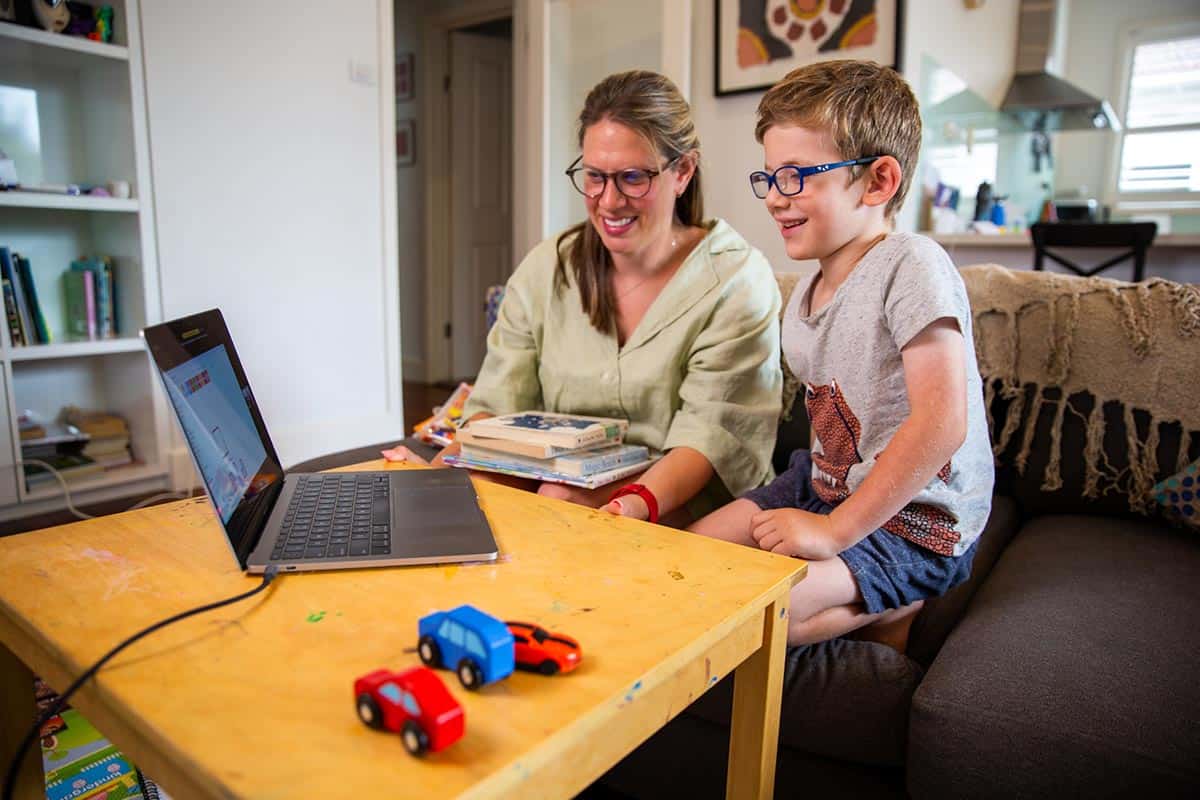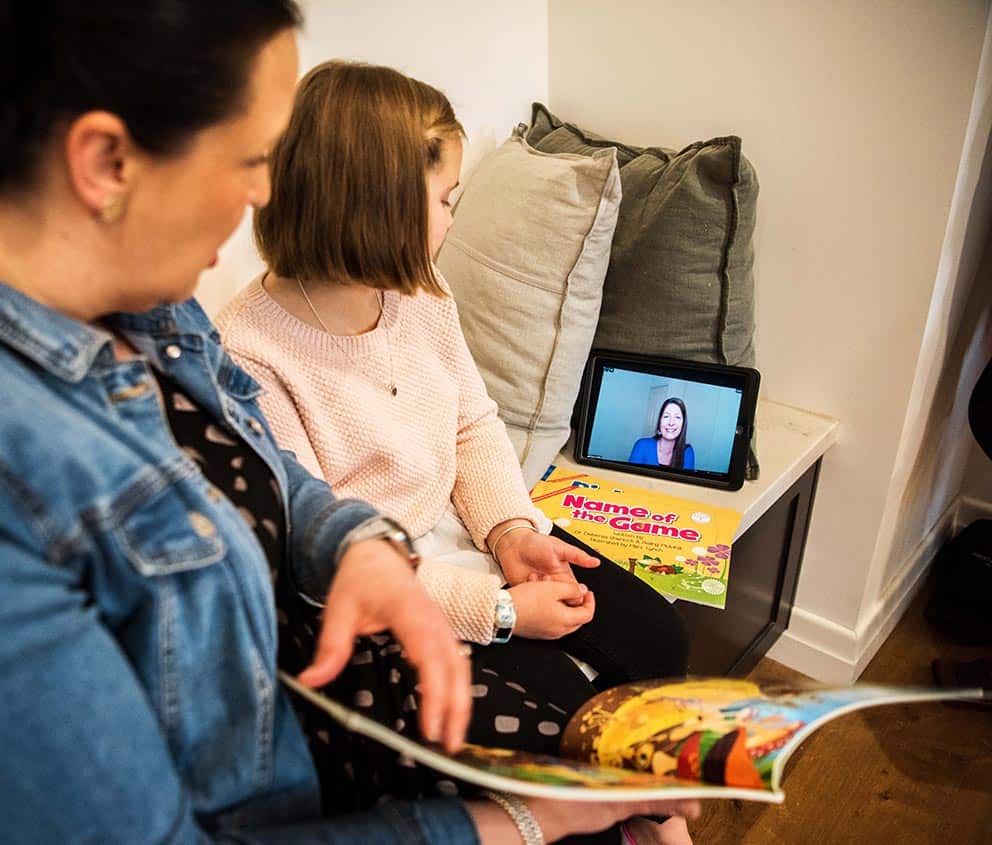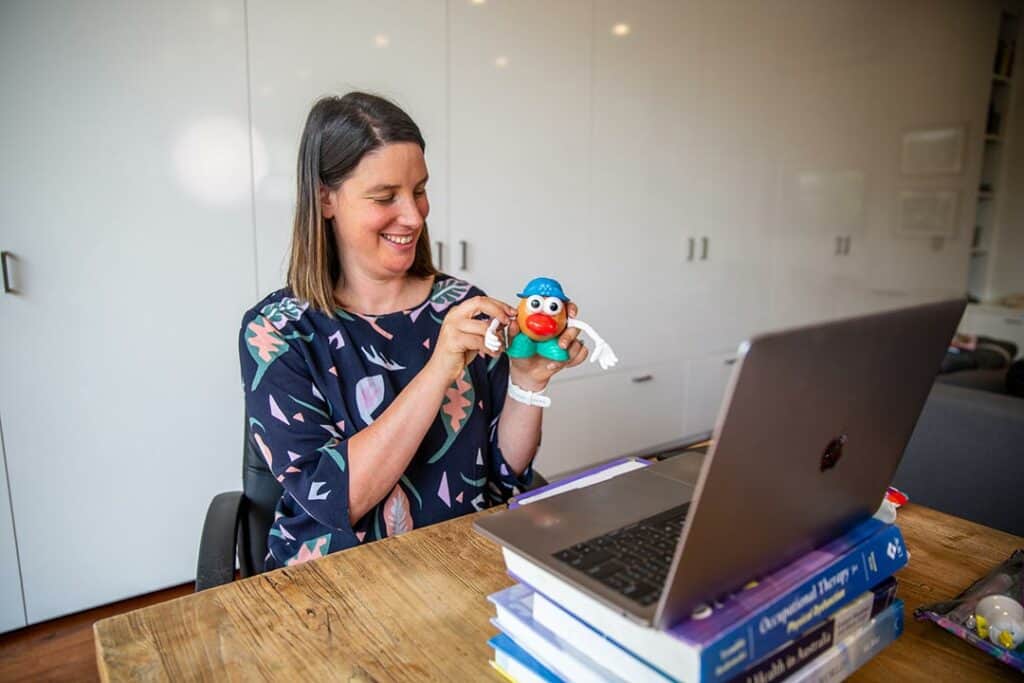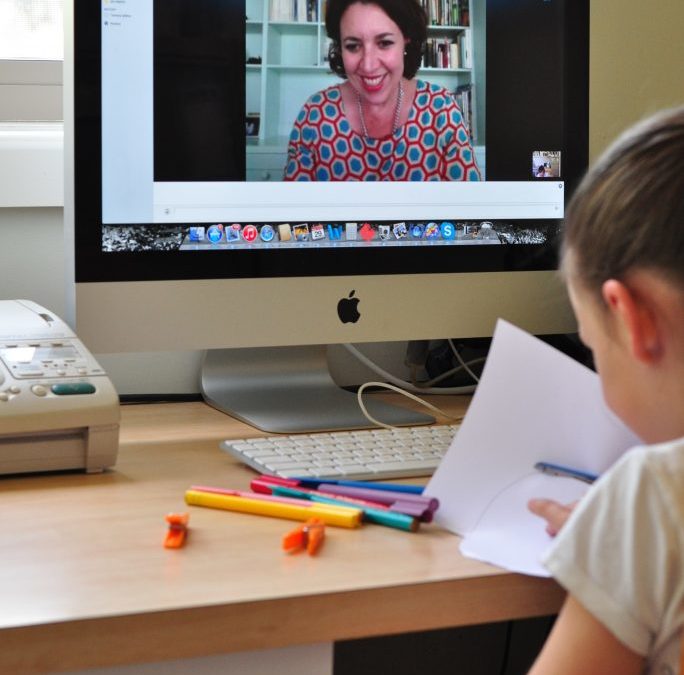What is speech therapy? Speech therapists work with people of all ages, supporting them to develop their speech, language, social and eating skills. In this comprehensive guide, you will learn all about speech therapy, who can benefit from it, and how speech pathologists play a crucial role in this process.
Key Takeaways
- Speech therapy is an allied health service that helps individuals communicate to the best of their ability with personalised plans crafted by speech pathologists.
- Speech therapists are also known as speech pathologists and they support clients who may have difficulty with fluency, articulation or conversation skills.
- Therapy Connect offers evidence-based therapy services that are accessible, convenient and personalised to your needs and goals.
The Basics of Speech Therapy
Speech therapy can help to improve speech sounds and enhance communication skills so that our clients feel more confident.
Speech therapy, also known as speech pathology, is an allied health service and has the following benefits:
- Improves both your verbal and non-verbal communication skills
- Boosts social and conversation skills
- Increase functional literacy skills
- Support with a better understanding of body language, and non-verbal cues
- Pronunciation of words and sentences
- Improve specific vocal concerns
- Chew and swallow safely
- Learn to use augmentative and alternative communication (AAC) tools.
What is the Purpose of Speech Therapy?
Speech therapy treats a variety of conditions, including:
- Language
- Speech
- Voice
- Swallowing
Since these challenges differ from client to client, personalised programs are needed to cater for the distinct needs and goals of each client.

Types of Communication Challenges Addressed by Speech Therapy
Speech therapy caters to a wide range of communication challenges, including the following:
Articulation and Pronunciation
Speech disorders, including articulation disorders, involve difficulties with the physical production of sounds. They can be articulation errors, like lisping, caused by challenges with tongue placement or neurological disorders like apraxia, where the brain struggles to plan and coordinate muscle movements necessary for speech, thereby impacting an individual’s ability to communicate clearly with others.
Language Challenges
Language disorders impact a person’s ability to learn speech, name objects, and build sentences. Expressive language disorders involve challenges such as forming sentences, while receptive disorders create difficulties in understanding messages. Mixed disorders present both sets of challenges.
Cognitive-Communication Challenges
Cognitive communication disorders, affect processes like attention, memory, perception, problem-solving, and reasoning. They can lead to difficulty with maintaining attention during conversations, staying on topic, recalling information, understanding humour, and following instructions.
Techniques Used in Speech Therapy
Speech therapy employs various techniques to address different communication disorders. These techniques range from articulation exercises and fluency practice to language development activities, all of which aim to improve communication skills and prevent future communication disorders.
Articulation Exercises
Articulation exercises use age-appropriate activities and techniques to aid individuals in producing difficult sounds and enhancing pronunciation. Methods such as cued articulation, minimal pairs and the use of articulation cards assist clients in producing challenging sounds with greater ease, gradually leading to correct pronunciation within full sentences.
Fluency Training
Fluency training techniques include:
- Deep breathing
- Gentle initiations
- Pacing and timing to slow speech
- Diaphragmatic breathing
- Light articulatory contacts
These techniques facilitate more fluent speech and build confidence, contributing to smoother speech patterns.
Language Development Activities
Language development activities, like picture description tasks and interactive storybook reading, stimulate language development by enhancing vocabulary, supporting nonverbal communication, and engaging children in language learning. By improving their language skills, discussing concepts like colour, size, texture, and ownership during everyday situations like meal planning or grocery shopping integrates language learning into daily life.
The Benefits of Telehealth Speech Therapy with Therapy Connect
In today’s digital age, the benefits of telehealth speech therapy are becoming more apparent. Therapy Connect, Australia’s leading NDIS-funded online therapy provider, offers personalised speech therapy services to help individuals overcome speech, language, and communication challenges from the comfort of their own homes. This makes high-quality speech therapy services accessible to all residents of Australia, including those living in remote or rural locations.
With Therapy Connect, your loved one will be able to communicate to the best of their ability, including verbal and non-verbal language and swallowing. By choosing Therapy Connect, you get the following benefits:
Access to Highly-Qualified Therapists
One of the greatest benefits of Therapy Connect is access to top therapists across Australia. Overcoming the barriers of distance, Therapy Connect ensures that everyone, regardless of location, has access to the highest quality speech therapy services.
Convenience and Flexibility
The online platform offered by Therapy Connect provides unmatched convenience and flexibility. With this platform, you can access high-quality communication support from the comfort of your own home and schedule sessions at times that suit your lifestyle.
Personalised Treatment Programs
Therapy Connect is the most reliable telehealth speech therapy provider in Australia, offering personalised treatment programs that meet each individual’s needs. Their collaborative, family-centred approach ensures long-term improvements in communication.
Better Speech Clarity
Our speech therapy services can improve your communication skills, boost your social and conversation skills, increase your literacy skills, help you pronounce words and sentences more clearly, and address specific vocal and swallowing concerns.
Highly Experienced Practitioners
Therapy Connect employs over 70 qualified therapists committed to improving the lives of their clients. Through its online approach, clients are matched with allied health therapists across Australia for faster access to therapy.
Client-Centred Approach
At Therapy Connect, we adopt a client-centred approach to designing online speech therapy programs that meet each individual’s unique needs and therapy goals. Our highly qualified and experienced therapists provide continuous support to ensure you receive the best possible therapy.

How to Identify the Need for Speech Therapy
Having understood the basics of speech therapy, it’s important to discern when and how to identify the need for it. This process encompasses recognising early signs, acknowledging the significance of early intervention, and seeking professional consultation.
Early Signs to Look Out For
Early signs of speech and language difficulties can include:
- Delays in meeting communication milestones, such as babbling and first words
- Difficulty forming sentences
- Difficulties producing speech sounds
Difficulty understanding simple instructions and forming sentences
If these signs are observed, it’s essential to consult a speech therapy professional for an appropriate evaluation.
Importance of Early Intervention
Early intervention in speech therapy can lead to more effective communication, reduced frustration, and enhanced social interactions and academic performance.
Children can develop essential skills to interact with peers and communicate effectively by intervening early.
Tips to Support Your Loved One’s Speech Therapy Journey
Providing support on a loved one’s speech therapy journey requires dedication and commitment, active participation in therapy sessions, recognition of the value of family engagement, and constant encouragement and support.
Active Involvement in Therapy Sessions
Being actively involved in therapy sessions significantly affects a loved one’s speech therapy journey. Participating in sessions, understanding weekly goals, and discussing active engagement with the therapist aids in reinforcing the therapy’s objectives outside of sessions.
Reinforcing Skills at Home
Reinforcing speech therapy skills at home can be seamlessly integrated into daily routines. Encouraging the use of speech therapy skills during routine activities like grocery shopping or dining out helps children apply communication techniques in real-world scenarios.
Encouraging Communication and Social Interaction
Encouraging communication and social interaction is crucial for the success of speech therapy. Teaching children gestures and body language, such as waving or nodding, supports communication when they find speech challenging.
Frequently Asked Questions
Why do people see a speech therapist?
People see a speech therapist to improve their communication skills, which may be affected by conditions like cerebral palsy, dementia, developmental delays in children, childhood apraxia of speech, autism, and sensory impairments. This professional help can address speech difficulties and support individuals’ communication needs.
How do I know if my child needs speech therapy?
If your child shows difficulty in speaking, following directions, or using gestures, or if their speech is unclear, they may need speech therapy. Keep an eye on these signs and consider consulting a speech therapist for an evaluation.
What will a speech therapist do?
A speech therapist will work with other health professionals to help people with speech, language, interaction, fluency, reading, and safe eating and swallowing. They provide a range of services to support individuals’ communication needs.
What is the role of a speech pathologist?
Speech pathologists play a crucial role in assessing and treating speech, language, and swallowing disorders in both children and adults. They help to improve cognitive-communication and social communication.
What are some early warning signs of speech and language difficulties?
If you notice delays in babbling, gestures, understanding instructions, or forming sentences, seeking advice from a speech therapy professional to address potential speech and language difficulties is crucial.




